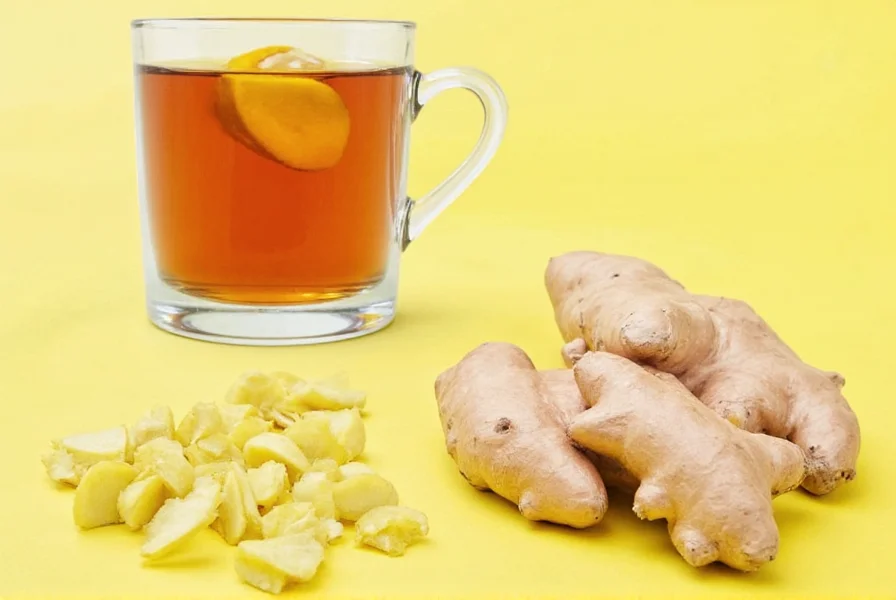When stomach discomfort strikes, many people reach for ginger tea as a natural remedy—and for good reason. This centuries-old solution has gained modern scientific validation for its effectiveness in treating various digestive issues. Unlike pharmaceutical options, ginger tea offers gentle relief without significant side effects when used appropriately.
How Ginger Tea Soothes Digestive Discomfort
Ginger contains powerful bioactive compounds called gingerols and shogaols that interact with your digestive system in multiple beneficial ways. These compounds work through several physiological mechanisms:
| Mechanism | Effect on Digestion | Scientific Support |
|---|---|---|
| Gastric motility regulation | Accelerates stomach emptying, reducing bloating | Multiple clinical trials show 25% faster gastric emptying |
| 5-HT3 receptor antagonism | Reduces nausea signals to the brain | Comparable mechanism to some anti-nausea medications |
| Anti-inflammatory properties | Calms intestinal inflammation and spasms | Studies show reduced inflammatory markers in digestive tract |
| Antioxidant effects | Protects stomach lining from irritation | Research demonstrates reduced oxidative stress in gastric tissue |
Preparing Effective Ginger Tea for Upset Stomach
Not all ginger tea preparations deliver equal relief. The method of preparation significantly impacts the concentration of active compounds. For maximum therapeutic benefit when treating an upset stomach:
Traditional Fresh Ginger Tea Recipe
This preparation method extracts the highest concentration of ginger's active compounds:
- Peel and grate 1-2 tablespoons of fresh ginger root
- Bring 8-12 ounces of water to a rolling boil
- Add grated ginger and simmer for 5-10 minutes (longer for stronger tea)
- Strain and optionally add lemon or honey
- Drink while warm, preferably in small sips

When Powdered Ginger Works Best
While fresh ginger generally provides superior results, powdered ginger offers convenience during travel or when fresh ingredients aren't available. Use 1/4 to 1/2 teaspoon of high-quality ginger powder per cup of hot water. Note that powdered ginger contains lower concentrations of active compounds than fresh, so you may need to increase the amount slightly for equivalent effects.
Scientific Evidence Behind Ginger Tea for Digestive Relief
Ginger's reputation as a digestive aid isn't merely anecdotal—numerous clinical studies support its effectiveness:
- A 2020 meta-analysis in Nutrients reviewed 12 clinical trials and concluded ginger significantly reduces nausea severity across multiple conditions
- Research published in European Journal of Gastroenterology & Hepatology demonstrated ginger accelerates gastric emptying by 25% compared to placebo
- A study in Obstetrics & Gynecology found ginger reduced pregnancy-related nausea by 27% with minimal side effects
- Multiple studies show ginger's effectiveness for motion sickness, with results comparable to over-the-counter medications but with fewer side effects
The American College of Gastroenterology recognizes ginger as a potentially beneficial complementary therapy for functional dyspepsia and nausea management, though they note it shouldn't replace prescribed treatments for chronic conditions.
Optimal Dosage and Timing for Maximum Relief
Understanding proper dosage ensures you receive ginger tea's full benefits without potential side effects:
- Mild discomfort: 1 cup of standard-strength ginger tea (5-7 minute steep)
- Moderate nausea: 1-2 cups of stronger tea (10 minute steep with 2 teaspoons ginger)
- Preventative use (before travel): 1 cup 30-60 minutes before potential nausea trigger
- Daily maximum: 3-4 grams of ginger total from all sources (approximately 2-3 cups of strong tea)
For acute upset stomach, sip ginger tea slowly rather than drinking it all at once. Many people find relief within 15-30 minutes of consumption. If symptoms persist beyond 2 hours or worsen, consider other causes requiring medical attention.
Safety Considerations and Potential Side Effects
While generally safe, ginger tea isn't appropriate for everyone. Understanding these considerations ensures safe usage:
Who Should Use Caution
- Pregnant women: Generally safe in moderation (up to 1g daily), but consult your healthcare provider first
- People on blood thinners: Ginger may enhance anticoagulant effects—discuss with your doctor
- Those with gallstones: Ginger may increase bile production—use with medical supervision
- Individuals with GERD: May worsen symptoms in some people despite helping others
Common Side Effects to Monitor
Most people tolerate ginger tea well, but some may experience:
- Mild heartburn (especially when consumed on empty stomach)
- Stomach acidity in sensitive individuals
- Increased burping or gas initially as digestion improves
- Rare cases of mouth irritation from strong concentrations

When Ginger Tea Isn't Enough: Warning Signs
Ginger tea works well for mild, temporary digestive upset, but certain symptoms require medical evaluation:
- Severe or persistent vomiting lasting more than 24 hours
- Blood in vomit or stool
- High fever accompanying stomach discomfort
- Severe abdominal pain that doesn't improve
- Symptoms of dehydration (dark urine, dizziness, extreme thirst)
- Unexplained weight loss with digestive symptoms
Chronic digestive issues like frequent heartburn, persistent diarrhea, or recurring abdominal pain warrant professional medical evaluation rather than self-treatment with ginger tea. While excellent for occasional upset stomachs, it doesn't address underlying conditions like ulcers, gallbladder disease, or inflammatory bowel disorders.
Complementary Natural Remedies for Digestive Comfort
Ginger tea works particularly well when combined with other gentle digestive aids:
- Peppermint tea: Soothes intestinal spasms (avoid if you have GERD)
- Chamomile tea: Reduces inflammation and promotes relaxation
- Lemon water: Helps balance stomach pH and stimulates digestion
- Gentle abdominal massage: In clockwise motion to encourage digestion
- Resting upright: Prevents acid reflux while digestion occurs
For motion sickness, combining ginger tea with acupressure wristbands provides enhanced protection. During pregnancy-related nausea, ginger tea plus small, frequent protein-rich snacks often yields the best results.
Conclusion: Ginger Tea as Part of Your Digestive Wellness Toolkit
Ginger tea remains one of the most scientifically supported natural remedies for occasional digestive discomfort. Its effectiveness for nausea relief, stomach pain reduction, and improved digestion makes it a valuable addition to any home wellness routine. By preparing it correctly, understanding appropriate dosage, and recognizing when to seek medical help, you can safely harness ginger's digestive benefits. Keep fresh ginger root in your kitchen for immediate preparation when stomach discomfort strikes—it's a simple, natural solution backed by both tradition and modern science.
How quickly does ginger tea work for an upset stomach?
Most people experience relief from nausea and stomach discomfort within 15-30 minutes after drinking freshly prepared ginger tea. The active compounds begin working almost immediately on digestive tract receptors, with maximum effects typically occurring within 30-60 minutes. For best results, sip the tea slowly rather than drinking it all at once.
Can children safely drink ginger tea for stomach upset?
Children over 2 years can safely consume diluted ginger tea for stomach upset, but in smaller quantities than adults. For children 2-6 years, use half a teaspoon of grated ginger in 4 ounces of water. For children 6-12 years, use one teaspoon in 6 ounces of water. Always consult a pediatrician before giving ginger tea to children under 2 or if symptoms persist beyond 24 hours.
Is store-bought ginger tea as effective as homemade for upset stomach?
Most commercial ginger teas contain significantly less active ginger compounds than freshly prepared tea. Ready-made ginger tea bags typically deliver only 10-25% of the gingerols found in fresh ginger preparations. For therapeutic effects during stomach upset, homemade tea from fresh ginger root provides substantially stronger relief. If using store-bought tea, choose brands listing ginger as the first ingredient and containing at least 500mg of ginger per serving.
Can I drink ginger tea daily for digestive health?
Yes, most adults can safely consume 1-2 cups of ginger tea daily for ongoing digestive support. The recommended daily limit is 3-4 grams of ginger total from all sources. Regular consumption may help maintain healthy digestion, but if you experience heartburn or other side effects, reduce the amount. People with certain medical conditions or taking specific medications should consult their healthcare provider before daily use.
What's the difference between using fresh ginger versus dried ginger for tea?
Fresh ginger contains higher concentrations of gingerols, which convert to more potent shogaols when heated. Fresh ginger tea typically delivers 2-3 times more active compounds than tea made from dried ginger powder. Fresh ginger also provides a brighter, more complex flavor profile. However, dried ginger works well when fresh isn't available—just use about half the amount since it's more concentrated. For maximum therapeutic benefit during stomach upset, fresh ginger is preferable.











 浙公网安备
33010002000092号
浙公网安备
33010002000092号 浙B2-20120091-4
浙B2-20120091-4